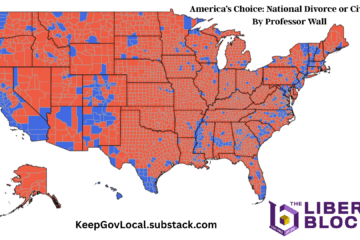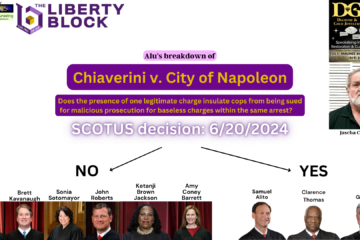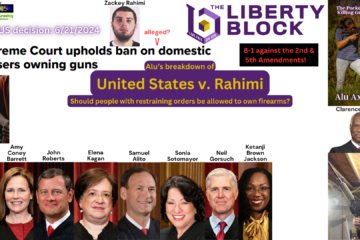By Ian Underwood for The Liberty Block
In California, a physician who expresses a view on COVID-19 that differs from the one held by the governor of that state is guilty of ‘professional misconduct’ and is subject to losing his license to practice — depriving him of the opportunity to make a living, and depriving his patients of the benefit of his training, experience, insight, and wisdom.
In Canada, Dr. Jordan Peterson is being threatened with the loss of his license to practice as a clinical psychologist because, among other things, he expressed disagreement with Sports Illustrated’s choice of a non-athletic cover model for its annual swimsuit issue.
And who could forget Canada’s prime minister directly threatening truckers who disagreed with his policies with ‘losing your license, your livelihood’. And ordering banks to freeze the accounts of citizens who supported the truckers.
Here in New Hampshire, it wasn’t so long ago that businesses were being declared ‘essential’ or ‘non-essential’ according to the whim of our governor; and even so-called essential businesses were being micro-managed out of business under the novel constitutional theory that ‘public health trumps everything’.
How can such things even occur in free countries? How can elected officials, armed with ’emergency powers’, transform themselves into emperors? The simplest answer is: Through the occupational licensing of businesses and professionals.
If a government can force people to ask for permission to make a living, to feed and house themselves and their families, then that government can withhold that permission in order to crush opposition to its policies, or even to favored narratives.
Like a draft card, an occupational license is based on the idea that you belong, not to yourself, but to the government, as a kind of resource to be deployed for the common good, or to protect public health, or to promote some other government interest.
We have words like ‘totalitarian’, ‘Soviet’, ‘Stalinist’, ‘despotic’, and so on, to describe this kind of idea. The word ‘American’ is supposed to describe its opposite.
Some will argue that the purpose of licensing is to protect people from evil or incompetence. But we know that this isn’t the case because it’s not the customers who show up to demand licensing. It’s the businesses and professionals who know that it gives them a state-enforced monopoly, i.e., protection from competition.
Which, if you take Article 83 of the NH state constitution at face value, is unconstitutional:
“Free and fair competition in the trades and industries is an inherent and essential right of the people and should be protected against all monopolies and conspiracies which tend to hinder or destroy it.“
All monopolies and conspiracies. Not just those approved by or controlled by the government.
One of the few silver linings in the government’s over-reaction to COVID-19 is that it has exposed the dangers that licensing poses — both to businesses that have traditionally relied on its protection, and to the people who rely on those businesses.
Fortunately, there is a simple, straightforward way to maintain whatever protections licensing may offer, while eliminating its ability to instantly morph democracy into despotism.
In other words, to throw out the bathwater, while keeping the baby.
Allow businesses and professionals to get certified by the state, and allow customers who value such certification to rely on it. But don’t punish those who don’t want the state’s judgment about quality, innovation, cost, risk, and other factors to be substituted for their own judgment.
Let people decide for themselves how much protection they need, and whether they believe that elected officials and unelected bureaucrats — who will often have values and priorities that are very different from their own! — are the right people to provide that protection, or whether other mechanisms would be better suited to that purpose.
You may be thinking: How can a license be optional? Some of you have an answer to that in your wallet, in the form of a New Hampshire Pistol and Revolver License.
Although it’s a license, it’s completely optional. You don’t need it. But you might get one because it identifies you as a state-certified non-criminal, which may, in some situations, make other people (or other states) feel more secure about dealing with you.
That is the model for how the licensing of professionals and businesses should work. Certification, without coercion. Reassurance, without repression. Protection, without paternalism.
It would protect the inherent and essential right to competition, by prohibiting government from using monopolies to strangle that right.
It would protect the right to medical freedom, by prohibiting government from using monopolies to force people get the jab, in order to keep their jobs.
And it would protect the rights to freedom of speech and association, by prohibiting government from using its monopolies to punish people for gathering together — for worship, or celebration, or any other reason — and for speaking their minds.
House Bill 507 is a great bill proposed by Representative Matt Santonastaso, which would remove the punishments for people who work without government permission (a license) as long as they don’t claim to have a license. But the bill doesn’t go far enough — it should be amended to encompass licenses required by businesses of all kinds and not just professionals. But it would move us in the right direction: away from the latent totalitarianism of government monopoly and back towards the freedom envisioned, and guaranteed, in our state constitution.
This article does not necessarily reflect the opinions of The Liberty Block or any of its members. We welcome all forms of serious feedback and debate. Ian Underwood has been a planetary scientist and artificial intelligence researcher for NASA; the director of the renowned Ask Dr. Math service; a co-founder of Bardo Farm and Shaolin Rifleworks; and a popular speaker at liberty-related events. He lives in Croydon, New Hampshire. Ian recently published a book about the dangers of state-mandated licensing schemes.


